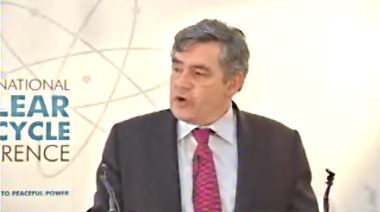Brown calls for renewed nuclear bargain
17 March 2009
The UK wants a debate on a new global framework for nuclear energy, aimed at ensuring its widespread peaceful use for power and a process for disarmament.
 |
| Gordon Brown this morning |
At the opening of the International Nuclear Fuel Cycle Conference in London today, prime minister Gordon Brown declared his country's ambition to lead in setting the "foundations of our common security and a sustainable future."
In question are three major concerns which relate to nuclear energy: the threat posed by the existence of nuclear weapons; the potential risk that countries using nuclear energy could secretly develop weapons; and the need for nuclear power to take a major role in fighting climate change.
Brown said nuclear would be important in cutting greenhouse gas emissions by half before 2050: "Whether we like it or not we will not meet the challenges of climate change without the widespread use of nuclear power."
"No cost-effective low carbon technology must be off limits," he continued, stating that 32 new reactors per year will be required to end carbon dioxide production from electricity and concluding, "However, we look at it, we will not secure the supply of the sustainable energy on which the future of our planet depends without a role for civil nuclear power."
But with nuclear power comes concern, Brown said, over nuclear weapons proliferation, of which Iran is a "test case." Brown pointed to the way Iran has conducted its nuclear program, first by concealment then a refusal to cooperate and a flouting of UN sanctions was "unacceptable." This "refusal to play by the rules leads us to view its nuclear program as a critical proliferation threat."
New system, tougher IAEA
To address this kind of problem Brown is supporting current moves towards a nuclear fuel bank under the International Atomic Energy Agency (IAEA), but his vision also includes new legislation built around a "renewed and refreshed" Nuclear non-Proliferation Treaty (NPT). This would further enshrine every country's right to enjoy the benefits of nuclear power, but with very tough responsibilities, while states already holding nuclear weapons would be obliged to verifiably disarm and inspections would even extend to their weapons facilities in future.
Brown calls for consideration of regional fuel cycle arrangements that could cover high-level radioactive waste management as well as the front end of the fuel cycle. Brown cited the Middle East as a region in which this could be particularly helpful. One element in the system could be a nuclear fuel bank as a guarantee of supply, which any country would be welcome to use - as long as it was maintaining commitments to a strengthened NPT and safeguards regime.
Another change would relate to safeguards: If there was any indication that a state was not fulfilling its obligations to ensure nuclear materials are never used for weapons, the result would be automatic referral to the UN Security Council for "clear, tough and immediate" sanctions. In effect, the burden of proof on safeguards would be reversed: It would be each country's responsibility to prove to the IAEA that it acts purely peacefully, rather than the IAEA's job to probe for evidence of abuse.
Great power, great responsibility
Brown recalled the "failure" of the 2005 review of the NPT, saying "We cannot afford to fail" at the next NPT review in 2010. He said that Britain will, with other countries, set out a 'Road to 2010' with detailed plans for the civil nuclear power sector to place the IAEA at the centre of fissile material security in every country. Proposals would be developed with industry, academia and governments.
Brown also wants the world's nuclear weapons states to hold a summit and come up with ways to achieve disarmament, one of the goals for the NPT since inception in 1968. This will cover confidence-building measures to assure non-weapons states as well as using new science to verify the destruction of atomic weapons. The goal is to create a climate in which, "countries can refuse to take up nuclear weapons in the confidence they will never be required."
As the head of a weapons state, Brown was proud that the UK has reduced the number of nuclear weapons it deploys by 50% since 1997. The current figure of 160 warheads is always under review, he said, before urging the USA and Russia to agree new targets after the expiry of the START treaty this year. Brown said that the UK "stands ready" to join a binding multilateral disarmament program as soon as it was practical to do so.
Praise and skepticism
Commentators lauded Brown for his candour in asserting nuclear power's environmental value and for his commitment to a new campaign of nuclear disarmament. But several industry experts voiced scepticism as to whether an IAEA-led nuclear fuel regime would strengthen non-proliferation.
World Nuclear Association head John Ritch praised Brown's proposal to raise standards for non-proliferation compliance, but questioned the concept of IAEA-supervised fuel assurances. "A bureaucratically controlled fuel bank would be fine if it accomplished something. But what security gain can we realistically expect? Countries that demonstrate adherence to the NPT have access to good commercial supply, while governments pursuing a weapons option will scoff at fuel assurances, arguing that they're unreliable. Whose behaviour then will the fuel bank change?"